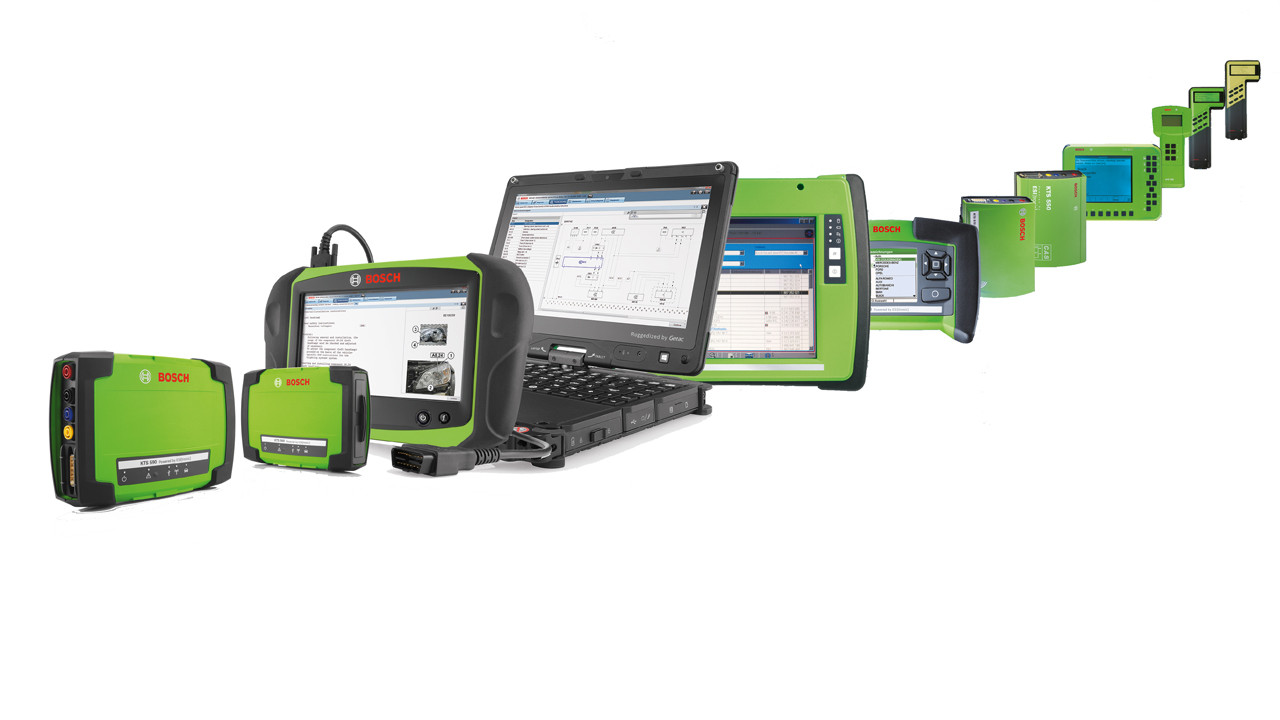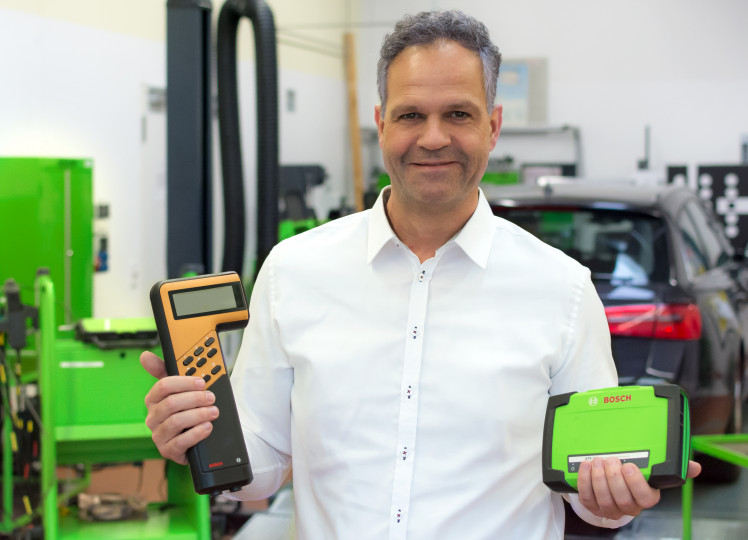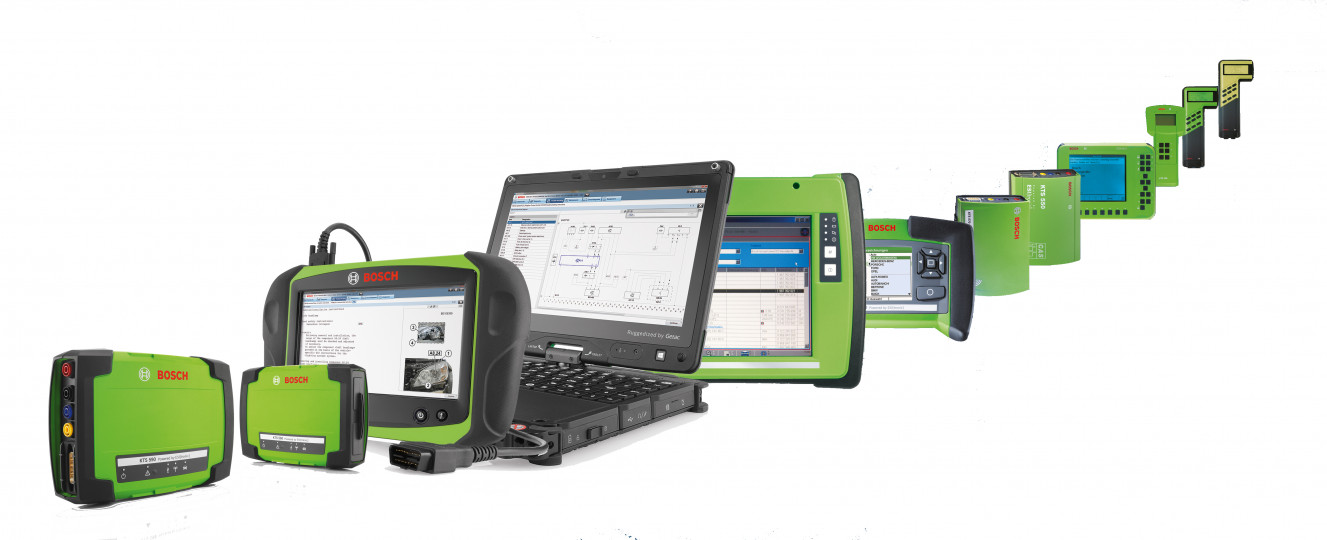Back in 1988, Bosch KTS 300 – the first diagnostic tester – first allowed independent workshops to check electronic vehicle systems. Back then, Bosch named it KTS or “Klein-Tester-Serie”, which is German for series of small testers. The name prevailed down to the present day. Modern diagnostic testers are still called KTS. “Ever since the company was first founded, the Bosch has been a name standing for development competence, technical quality and reliability. 30 years ago, we were among the first companies also starting to meet these requirements in the field of control unit diagnostics,” Oliver Frei, Regional President Europe at Bosch Automotive Service Solutions, says thus describing the motivation driving continuous further development of KTS diagnostic testers. “We have always aimed on increasing efficiency and effectiveness of everyday work at workshops by means of our diagnostic testers and modern software. Diagnostic solutions fit for the future of workshops – that’s what’s still driving us,” Frei continues. Consequently, the 30-year success story of Bosch diagnostic testers will go on in future as well – thanks to optimized control unit diagnoses and new generations of KTS testers providing future-oriented hardware solutions
The success story began with the “Bosch Hammer”
When the first KTS was launched, it was able to handle engine management data of cars of three different makes. But the number of control units KTS was able to test grew rapidly. By 1999, it allowed control
unit diagnoses on some 120 systems of 25 different vehicle manufacturers. Accordingly, the automotive sector soon got to know KTS 300 as “Bosch Hammer” and as a synonym for engine testers. In 1999, the Bosch Esitronic workshop software, was launched
on the diagnostic testers – yet another important milestone for control unit diagnostics and further development of the KTS series. Quarterly updates – at first on CD, then on DVD and today mostly online – make sure workshops are always provided up-to-date
diagnostic data suitable even for latest vehicle models and control units. Nowadays, KTS diagnostic testers and Esitronic 2.0 allow workshops to perform control unit diagnoses on more than 90 000 vehicle models of more than 150 different makes.
30
years of experience and competence in control unit diagnoses
Several electronic vehicle systems used as original equipment by vehicle manufacturers around the world have been developed by Bosch engineers. Concomitant with the first electronic systems
in automotive engineering, Bosch also used its high competence in the field for its test equipment. For 30 years now, Bosch has thus been in the lead in terms of control unit diagnostics. While the demands placed on technically qualified and efficient
diagnoses at automotive workshops grew, Bosch continuously improved its Klein-Tester-Serie KTS (German for series of small testers) and its Esitronic workshop software. Today, KTS modules complement exhaust gas testers and vehicle system testers. They
are both either integrated into a trolley housing a PC, a screen and a printer or available as part of handy tablet computers suitable for mobile use at the workshops. Using Bluetooth, Wi-Fi or LAN, they can be connected with other testers, with the
workshop network or even with the Internet. In addition, they also support all common communication protocols used by electronic vehicle systems.
Future-proof hardware with PassThru and ethernet interfaces
By means of KTS 560/590, the latest
generation of diagnostic testers, Bosch once again supports independent multi-brand workshops with regard to service and repair tasks on modern vehicle systems. The Euro5/6 standards place car manufacturers under the obligation to make any technical
repair information available to independent workshops by means of their online portals. In order to access these online portals, a PassThru interface is needed. Already since 2009, Bosch KTS devices are PassThru-enabled and can still be used to access
repair data – although with some restrictions. Current KTS 560/590 testers feature an improved PassThru interface providing workshops with a trouble-free access to data of almost all vehicle manufacturer portals. This allows independent workshops to
maintain modern vehicle models and to reprogram control units. They do not have to send their customers to authorized workshops anymore in case such tasks are to be performed. Using KTS 560/590, workshops are also well prepared for the future. The devices
already include the new, Ethernet-based Diagnostics over Internet Protocol (DoIP) diagnostic interface. It allows much higher data transfer rates particularly important considering growing data volumes required, for instance, by driver assistance systems.
More and more vehicle manufacturers thus use also Ethernet for diagnoses. Basic diagnoses will still be possible via CAN interface, for comprehensive diagnoses or flashing of control units, however, an Ethernet interface as the one included at the latest
KTS generation will be required.
Mónika Hack
+36 70 510 5516
The Automotive Aftermarket division (AA) provides the aftermarket and repair shops worldwide with a complete range of diagnostic and repair shop equipment and a wide range of spare parts – from new and exchange parts to repair solutions – for passenger cars and commercial vehicles. Its product portfolio includes products made as Bosch original equipment, as well as aftermarket products and services developed and manufactured in-house. About 17,000 associates in more than 150 countries, as well as a global logistics network, ensure that some 650,000 different spare parts reach customers quickly and on time. In its “Automotive Service Solutions” operations, AA supplies testing and repair-shop technology, diagnostic software, service training, and information services. In addition, the division is responsible for the “Bosch Service” repair-shop franchise, one of the world’s largest independent chains of repair-shops, with some 16,000 workshops, and more than 1,000 “AutoCrew” partners.
Additional information can be accessed at www.bosch-automotive-aftermarket.com
The Bosch Group is a leading global supplier of technology and services. It employs roughly 400,500 associates worldwide (as of December 31, 2017). According to preliminary figures, the company generated sales of 78 billion euros in 2017. Its operations are divided into four business sectors: Mobility Solutions, Industrial Technology, Consumer Goods, and Energy and Building Technology. As a leading IoT company, Bosch offers innovative solutions for smart homes, smart cities, connected mobility, and connected industry. It uses its expertise in sensor technology, software, and services, as well as its own IoT cloud, to offer its customers connected, cross-domain solutions from a single source. The Bosch Group’s strategic objective is to create solutions for a connected life, and to improve quality of life worldwide with products and services that are innovative and spark enthusiasm. In short, Bosch creates technology that is “Invented for life.” The Bosch Group comprises Robert Bosch GmbH and its roughly 440 subsidiaries and regional companies in 60 countries. Including sales and service partners, Bosch’s global manufacturing, engineering, and sales network covers nearly every country in the world. The basis for the company’s future growth is its innovative strength. At 125 locations across the globe, Bosch employs 62,500 associates in research and development.
Additional information is available online at www.bosch.hu, www.bosch.com, www.iot.bosch.com, www.bosch-press.com, www.twitter.com/BoschPresse





